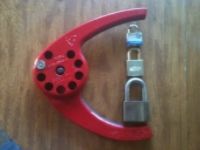Well, my phone makes video with crappy quality, so I'm going to stick with images

So, to start let me explain a few things:
GWiens2001 wrote:Seeing that you have a cutaway to see what is happening with the levers and gates, couldn't you make a 'master' key? It seems that the 'slave' key would simply not move one or more of the levers, preventing the bolt from moving past a certain point. It should be fairly easy (in theory, remember that you probably know more about lever locks than I do) to see which lever(s), and therefore key bits, need to be modified to make your 'master' key.
You are right. You seem to have completely understand how these operate, and yes, It wouldn't be too hard (assuming I can impression... I've never done it yet and it will be a great project for me!)
In order to do that, I would need to cut the key exactly like the one I have, but the middle section (where it has a gap), in there I would have to see just how much to cut to make it lift the lever to the exact spot.
Here's an image of the first two levers, notice the lack of notches on the first two gates, wich allows a completely filled down key to operate those levers:

And here's the 3rd gate not allowing the bolt to go further (I'm trying to turn the key in this image):

ARF-GEF wrote:You could make a slave key which can only turn once (has only one side correctly cut/cut at all).
In theory.. Yes. But it would bring problems. As you can see in the image, the key has a small notch on one of the sides. That is meant to make you insert the key on the correct position and not upside down (see the keyway image). So, you always have to make 2 turns in order to remove the key from the lock. If you lock with one turn, the key will not come out.
You could remove that notch but when someone turns only once and remove the key, original keys won't fit since you would have to insert a key upside down to operate the lock.
You could however use that key only to open the lock when unlocked, since it only retracts the bolt and then comes to the original position. But if the lock was locked, the key would unlock 1 turn, and if you don't turn again it would happen what I said before.


ARF-GEF wrote:You can also masterkey the locks with having gates made wider (so that there is more than one biting which lifts the lever and thus the gate into an open position).
I'm not sure about this, but I think that is how masterkeying lever locks is done. It however brings up the same problem as pin tumblers, less security, as it gets easier to lift the levers to the right position since the smal channel where the bolt has to pass is wider.
ARF-GEF wrote:In my eyes a good electronic lock is a lot more practical than those long and clumsy keys, but that's just a personal preference.
I think that way too. But here in Portugal it's very uncommon. The only electronic locks you usualy find is on buildings to open the front door (and it's not very common either).
The most common locks are regular pin tumblers for older houses, Dimple or Lever locks for everything else.
A friend got me an internal police document with a bunch of photos of people who are known for lockpicking to steal houses. They have homemade lever lockpicks. They are also able to open cross locks and cheap pin tumblers but they specialized on these.
ARF-GEF wrote:But as I said before with more complicated usage requirements you can't beat the electronic locks. As said it makes me I think in the banking sector the time of the keyed safes locks is over.
In fact, most high security safe locks (at least arround here) use lever locks like this. Probably with anti-pick levers and so on. But mainly lever locks, combined with some sort of combination system (either the regular combination lock, or 3 or more wheels with 1 letter each to make a word). About he banking sector, I'm not sure...
Darn, you both have only seen this lock on these pictures and you already know as much (or even more) than me about it

NEXT PROJECTS:
- Make working "master" key
- After picking it easily, modify the gates in order to have anti-pick notches. If that's a viable project, I could turn the lever locks I use on other applications safer without spending a dimme

Go ahead, keep plugging away, picking on me! You will end up on bypass or with rigor mortise.
- GWiens2001













